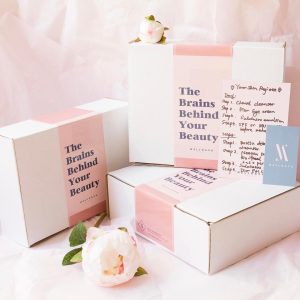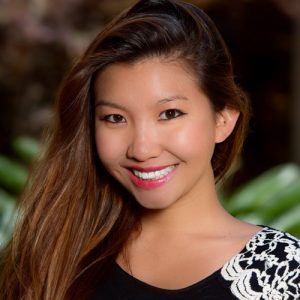We love Siqi Mou’s take on entrepreneurship, the future, and what it takes to be successful.
When she was a 10-year-old touring America as a Chinese pianist, Siqi Mou fell in love with Stanford University after performing there. She predicted that someday, somehow, she would return to that campus. Eight years later, she was a Stanford freshman. In business school (also at Stanford), she made another prediction: a company that could disrupt the $121 billion skincare industry would go far. Now she’s the founder of HelloAva, which is, even in its early days, seeming to do just that.
PREDICTION #1: Emergencies will happen. Stay calm (and copy successful companies).
Q. What’s the most unexpected, unpredictable thing you’ve learned this past year, with your business?
We had one of those “great problems to have” moments in August right after our launch at TechCrunch Disrupt NY. We got featured in Snapchat Discovery in a prime channel and all of the sudden we got a crazy amount of users requesting access. I remember waking up that day to my phone and had over 9,000 unread messages on our communication software. And many of these new users came from the UK and Europe.
I had no idea what had happened and immediately called my colleagues for an emergency meeting at the office as early as possible. At this point, we also had no idea about the Snapchat feature so we were all struggling to figure out where these customers came from. I even picked up a customer call from a UK number and chatted with a 15-year-old for ten minutes just to understand where he learned about us.
Finally we hit 9 AM and US users started coming in. Around 10:30 AM, our server was down and the customer service tool we used was also completely paralyzed. We did some emergency control and decided to remove the “Get started” button on our website and started taking a waitlist so that we could control the flow.
By 11 AM, we were already at over 15,000 users… We were so shocked.
We felt happy because it showed that we’d built a product that the customers really wanted, but at the same time, we felt conflicted and incompetent to maintain a good quality service. Our operation back then wasn’t set up to serve 15k users all at once. The waitlist was an emergency solution, but we still had to take care of each user one by one.
We pulled together a quick meeting to talk about next steps and how to take care of all of these users without ruining the user experience. We didn’t really have any solution in mind at first but then we decided to go through similar services with personal stylists/consultants on staff and tried to find some inspirations.
We looked into the business models of Stitchfix, Rocksbox, AdoreMe and Trunk Club and realized we could potentially achieve a higher conversion rate and filter out users who are not serious about buying.

This method wasn’t what we planned to do in the beginning when we started the company but truly enabled us to differentiate users and understand their LTV.
My lesson learned from this “great problem to have” incident was that, there was never going to be a point that we would be fully ready to scale until it just happened. And when the chaos happened, it was important to stay calm, learn from best practices, and figure out a feasible solution as quickly as possible and start testing. You won’t know what works until you start testing and sometimes that could be a bit chaotic and scary, but that’s part of the fun of the entrepreneurial journey.
PREDICTION #2 Chatbots, people, chatbots!
Q. You’ve said chatbots and messenger are the new apps. Do you really think ‘old school’ apps are on their way out?
I don’t think apps will be replaced completely, but I do think it is difficult to convince a user to download an app and keep the app for a long time. Additionally, AI has gotten to a place that it can now understand and take in user requests very efficiently and effectively, so I think in the future, the mobile landscape will be supported by a few major apps and then the other consumer needs will be fulfilled by chabots, or features within existing apps.
Q. Tell us how HelloAva changes the face cream buying experience.
It’s a 100% personalized experience: you text us your basic information, your selfie, answer a few skincare related questions, and then we match you to a licensed esthetician to pick the best products for your skincare needs.
We’re growing very quickly. We recently hit over 40k users, and our users are growing at over 200% month over month consecutively.
Q. How much and how fast is machine learning progressing your process or products at HelloAva?
Currently we are around 60% machine/automation and 40% human expertise. We believe the high personal touch experience that incorporates real human assistance is very crucial in what we are building since skincare is a very personal topic.
PREDICTION #3 Credibility is always going to matter.
Q. Do you recommend any products made by companies you have no relationship with?
Yes, we do that all the time! In fact, whether or not we have a relationship with a company does not impact the algorithm we use to recommend products in any way. We created 
Q. Does it feel inevitable that you got into skincare?
I’ve never had any work experiences in beauty. My background was primarily in finance, and news anchoring (in financial news), but during my time as a second-year MBA student at Stanford, I took a class called the Lean Launchpad that was co-taught by the business school and the engineering school (I am now a mentor for this class).
Through the experiments we did in this class, I realized that the way people purchase skincare products could definitely be improved and that the beauty industry could really benefit from some disruption.
Almost all the potential customers we interviewed complained about the trial-and-error process involved in finding skincare products.
There hasn’t really been a tool in the market that can offer consumers a fully personalized and unbiased experience to help them discover products that work for their specific needs (since everyone’s skin is different). So, we decided to build one and here we are!
Q. Hope you don’t mind us peeking at your Facebook cover photo, but we noticed that you had 12 bridesmaids at your wedding! That’s a lot of bridesmaids. Why did you have so many?
So that they can all be beta-testers of my startup. Just kidding! Honestly, I’ve just been so fortunate and blessed to have met so many wonderful, smart and beautiful women that have made a huge impact on my life. So, I wanted them all to be part of my big day.
Siqi’s advice for fellow founders/entrepreneurs:
“You will never be fully ready. If not us, then who? If not now, then when”. Sometimes we need to take a chance on ourselves.
Siqi’s favorite book this year:
My favorite book this year is Tools of Titans by Tim Ferriss. This is a book on the tactics, routines and habits of billionaires, icons and world-class performers. What makes the book very valuable is its focus on actionable details. I loved it so much and have already been using a lot of the actions recommended there. It has inspired me to work and live more efficiently, happily and fully.

